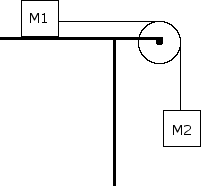Pulley Systems
A M = 6 kg box rests on a table and is connected to a second box of mass M = 5 kg via a rope that hangs over a frictionless pulley as shown. The coefficient of friction, is 0.15, Use free body diagrams to answer the following:

B. What is the tension in the rope?
Related Problems
An Object with mass m and initial velocity v is brought to rest by a constant force F acting for a time t and through a distance d. Possible expressions for the magnitude of the force F are: i. ii. iii.
ii only
iii only
i and ii only
ii and iii only
i, ii, and iii
A toy car of mass 6 kg moving in a straight path, experiences a net force given by the function F = -3t. At time t=0, the car has a velocity of 4 m/s in the positive direction and is located +8 m from the origin. The car will come instantaneously to rest at time t equal to
2/3 s
sqrt( 4/3 ) s
sqrt( 8/3 ) s
sqrt( 8) s
4 s
A M = 8 kg box rests on a table and is connected to a second box of mass M = 4 kg via a rope that hangs over a pulley as shown. The coefficient of static friction, is 0.2, and the coefficient of kinetic friction is 0.1. Use a free body diagrams to answer the following.

B. If the box does cause the system to move, what is the acceleration of the system, and the tension in the rope?
The large block m is 10 kg, and the smaller block m is 5 kg. The applied force, F is 100 N. The large block m experiences a 40 N frictional force opposing the applied force, and the smaller block m experiences a 20 N frictional force. Find the action-reaction force between the boxes. (This question requires Newton's Third Law.)
